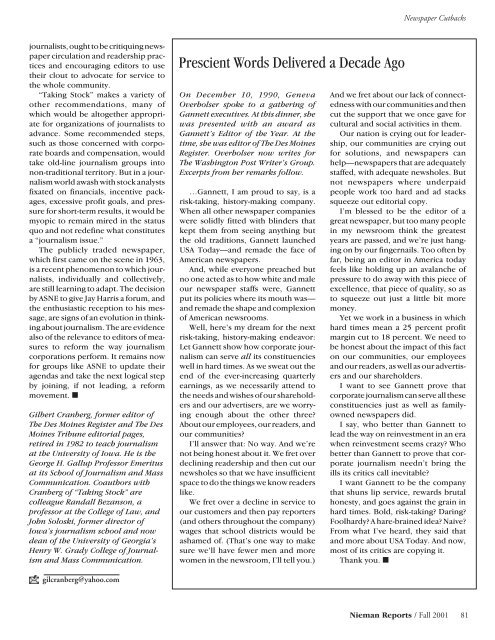Download - Nieman Foundation - Harvard University
Download - Nieman Foundation - Harvard University
Download - Nieman Foundation - Harvard University
You also want an ePaper? Increase the reach of your titles
YUMPU automatically turns print PDFs into web optimized ePapers that Google loves.
Newspaper Cutbacksjournalists, ought to be critiquing newspapercirculation and readership practicesand encouraging editors to usetheir clout to advocate for service tothe whole community.“Taking Stock” makes a variety ofother recommendations, many ofwhich would be altogether appropriatefor organizations of journalists toadvance. Some recommended steps,such as those concerned with corporateboards and compensation, wouldtake old-line journalism groups intonon-traditional territory. But in a journalismworld awash with stock analystsfixated on financials, incentive packages,excessive profit goals, and pressurefor short-term results, it would bemyopic to remain mired in the statusquo and not redefine what constitutesa “journalism issue.”The publicly traded newspaper,which first came on the scene in 1963,is a recent phenomenon to which journalists,individually and collectively,are still learning to adapt. The decisionby ASNE to give Jay Harris a forum, andthe enthusiastic reception to his message,are signs of an evolution in thinkingabout journalism. The are evidencealso of the relevance to editors of measuresto reform the way journalismcorporations perform. It remains nowfor groups like ASNE to update theiragendas and take the next logical stepby joining, if not leading, a reformmovement. ■Gilbert Cranberg, former editor ofThe Des Moines Register and The DesMoines Tribune editorial pages,retired in 1982 to teach journalismat the <strong>University</strong> of Iowa. He is theGeorge H. Gallup Professor Emeritusat its School of Journalism and MassCommunication. Coauthors withCranberg of “Taking Stock” arecolleague Randall Bezanson, aprofessor at the College of Law, andJohn Soloski, former director ofIowa’s journalism school and nowdean of the <strong>University</strong> of Georgia’sHenry W. Grady College of Journalismand Mass Communication.Prescient Words Delivered a Decade AgoOn December 10, 1990, GenevaOverholser spoke to a gathering ofGannett executives. At this dinner, shewas presented with an award asGannett’s Editor of the Year. At thetime, she was editor of The Des MoinesRegister. Overholser now writes forThe Washington Post Writer’s Group.Excerpts from her remarks follow.…Gannett, I am proud to say, is arisk-taking, history-making company.When all other newspaper companieswere solidly fitted with blinders thatkept them from seeing anything butthe old traditions, Gannett launchedUSA Today—and remade the face ofAmerican newspapers.And, while everyone preached butno one acted as to how white and maleour newspaper staffs were, Gannettput its policies where its mouth was—and remade the shape and complexionof American newsrooms.Well, here’s my dream for the nextrisk-taking, history-making endeavor:Let Gannett show how corporate journalismcan serve all its constituencieswell in hard times. As we sweat out theend of the ever-increasing quarterlyearnings, as we necessarily attend tothe needs and wishes of our shareholdersand our advertisers, are we worryingenough about the other three?About our employees, our readers, andour communities?I’ll answer that: No way. And we’renot being honest about it. We fret overdeclining readership and then cut ournewsholes so that we have insufficientspace to do the things we know readerslike.We fret over a decline in service toour customers and then pay reporters(and others throughout the company)wages that school districts would beashamed of. (That’s one way to makesure we’ll have fewer men and morewomen in the newsroom, I’ll tell you.)And we fret about our lack of connectednesswith our communities and thencut the support that we once gave forcultural and social activities in them.Our nation is crying out for leadership,our communities are crying outfor solutions, and newspapers canhelp—newspapers that are adequatelystaffed, with adequate newsholes. Butnot newspapers where underpaidpeople work too hard and ad stackssqueeze out editorial copy.I’m blessed to be the editor of agreat newspaper, but too many peoplein my newsroom think the greatestyears are passed, and we’re just hangingon by our fingernails. Too often byfar, being an editor in America todayfeels like holding up an avalanche ofpressure to do away with this piece ofexcellence, that piece of quality, so asto squeeze out just a little bit moremoney.Yet we work in a business in whichhard times mean a 25 percent profitmargin cut to 18 percent. We need tobe honest about the impact of this facton our communities, our employeesand our readers, as well as our advertisersand our shareholders.I want to see Gannett prove thatcorporate journalism can serve all theseconstituencies just as well as familyownednewspapers did.I say, who better than Gannett tolead the way on reinvestment in an erawhen reinvestment seems crazy? Whobetter than Gannett to prove that corporatejournalism needn’t bring theills its critics call inevitable?I want Gannett to be the companythat shuns lip service, rewards brutalhonesty, and goes against the grain inhard times. Bold, risk-taking? Daring?Foolhardy? A hare-brained idea? Naive?From what I’ve heard, they said thatand more about USA Today. And now,most of its critics are copying it.Thank you. ■gilcranberg@yahoo.com<strong>Nieman</strong> Reports / Fall 2001 81
















